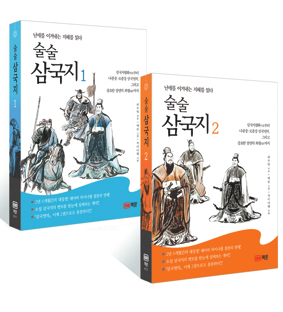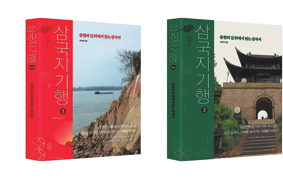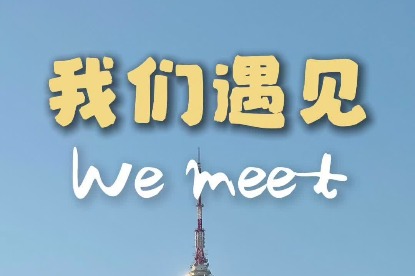Timeless wisdom: Chinese classic novel delights South Koreans


In South Korea, there is a saying: "Don't associate with someone who hasn't read Romance of the Three Kingdoms (RTK) three times".
Romance of the Three Kingdoms is a 14th-century Chinese novel by Luo Guanzhong. It chronicles the power struggles during the late Han Dynasty (206 BC-AD 220) and the Three Kingdoms period (220-280). Following the rival states of Wei, Shu, and Wu, led by figures like Liu Bei, Cao Cao and Sun Quan, it blends history with myth, exploring themes of strategy, loyalty and political intrigue.
"While the novel's setting is ancient, the stories within it are so relatable to our present. I believe that the essence that permeates society, past or present, remains timeless," says a user on Yes24, one of South Korea's leading online bookstores, explaining in a comment on The Three Kingdoms Made Easy why this Chinese classic is so popular in the country.
The Three Kingdoms Made Easy, published in March 2021, is a two-volume book created by Professor Her Woo-bum from Convergence Archaeology Major of Inha University in South Korea and illustrated by Chinese artist Ye Xiong.
Explaining why RTK has been so popular in South Korea for so many years, Her, now 64, gives three reasons.
South Korean society places great importance on traditional values such as "righteousness", "loyalty" and "trust", which are the core spirit of RTK, he says.
Moreover, the characters in RTK have distinct personalities and the stories are full of tension, which aligns well with the aesthetic of "heroic narratives" in South Korean popular culture, he notes.
Besides, with continuous reinterpretation through modern media such as games, films, and webtoons, RTK has long surpassed the realm of classical literature to become a "cultural symbol", he adds.
"If someone is completely unfamiliar with RTK, they might even be teased with the question, 'Are you not South Korean?' — a testament to its deep and lasting influence," he says.
Starting from 1997, Her has devoted many years to the field investigation of historical sites from the Three Kingdoms period. In 2009, he published Journey Through the Three Kingdoms, which he expanded to a two-volume version in 2023 after another 10 years' study.
Now he is continuing his research trips to China and plans to publish a complete three-volume edition of Journey Through the Three Kingdoms in 2032.
"As a reader who loves RTK, I started writing this book with the hope that many people would come to understand its charm more deeply," and "I want to share with readers the emotions I have felt through the travelogue that has continued for the past 20 years," he said in an interview in 2023.
To make the RTK stories more accessible to contemporary readers, especially those from the millennial and Gen Z generations (Generation MZ), Her re-organized the content of the novel and published the edition for easy reading.
In The Three Kingdoms Made Easy, he compresses the original 10 volumes of novel into two volumes, yet still fully covers all 120 chapters. He also includes Chinese literary critic in Qing Dynasty (1644-1911) Mao Zonggang's commentary in key sections and provides a comparative reading with the translations by South Korean authors, enhancing both understanding and enjoyment for readers.
Over 600 years ago, Romance of the Three Kingdoms was introduced to South Korea during the late Goryeo period (918-1392) and gained widespread popularity during the Joseon Dynasty (1392-1897).
In contemporary times, many renowned South Korean authors have translated the work. Enthusiasts often seek out new translations to explore various interpretations, Her notes.
This enduring affection for RTK has cultivated a vast publishing market in South Korea, with over 2,000 related books published, he adds.
These books cover a wide range of fields, including novels, history, economics, psychology, education, diplomacy, leadership, and self-improvement. People in South Korea use these publications to learn about anecdotes from the novel and incorporate them into everyday conversation, he says.
Apart from traditional comic books and novels, a wide variety of derivative content based on RTK, such as webcomics, web novels, and animations, has also been widely created and consumed catering to Generation MZ.
The most representative example is the turn-based tactical role-playing simulation grand strategy war games Romance of the Three Kingdoms series by the Japanese company Koei. Besides, mobile games such as The Blade of the Three Kingdoms and RTK Strategy Edition are also very popular in South Korea, he says.
According to Apple's App Store, The Blade of the Three Kingdoms has been downloaded more than 3 million times in South Korea.
Her first got to know the stories of RTK through reading a comic book as a little child. He then read the novel in primary school and senior middle school many times. During his university years, he began exploring it in depth. "At that time, I was majoring in South Korean literature and wanted to systematically study this Chinese classic most beloved by South Koreans," he says.
"It is not just a historical novel but a literary work that embodies human nature, wisdom, and strategy. At the same time, as an enthusiast of RTK, I also have a strong desire to explore it in depth," he says.
After spending over 20 years studying the novel and conducting field investigations, Her's understanding of the novel has evolved.
More than two decades ago, his beloved figures include the legendary military general Guan Yu, who served under Liu Bei and was known for his unwavering loyalty, martial prowess and moral integrity and chief strategist and chancellor Zhuge Liang, who also served under Liu and was celebrated for his intelligence, wisdom and innovative military tactics. He mainly focused on their heroic spirit and wisdom.
Now he has shifted his attention to "era" and "human nature" since "RTK is not merely a tale of political intrigue; rather, it vividly depicts the decisions individuals make and the wisdom they employ to navigate and survive in tumultuous times".
His favorite figures have also shifted from Guan Yu and Zhuge Liang to Lu Su.
"Although Lu Su is often portrayed in the novel as somewhat clumsy and frequently outwitted by Zhuge Liang, this depiction is not accurate. Historically, Lu Su possessed strategic foresight and debating skills on par with Zhuge Liang. It is this portrayal of Lu Su in historical records that makes me particularly admire and appreciate him," he says.
In addition, Her recently published An Abridged Translation of the Records of the Three Kingdoms aimed at middle-aged readers. This book serves as a life guide based on the RTK, focusing on how the pillar of a family, a key player in the workplace, or an organizational leader can overcome challenges and pursue a happy life when faced with difficult situations.
yangyangs@chinadaily.com.cn


































